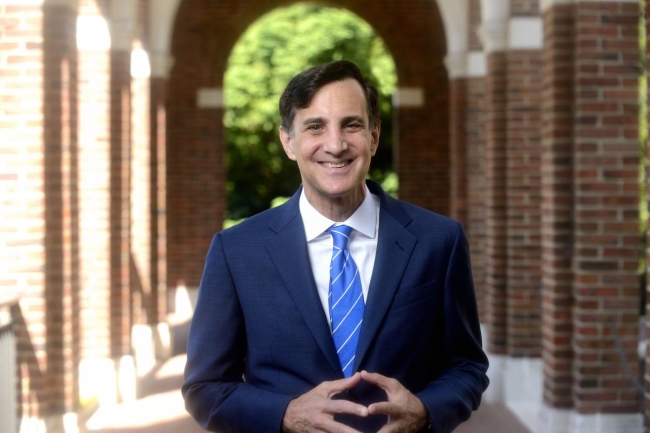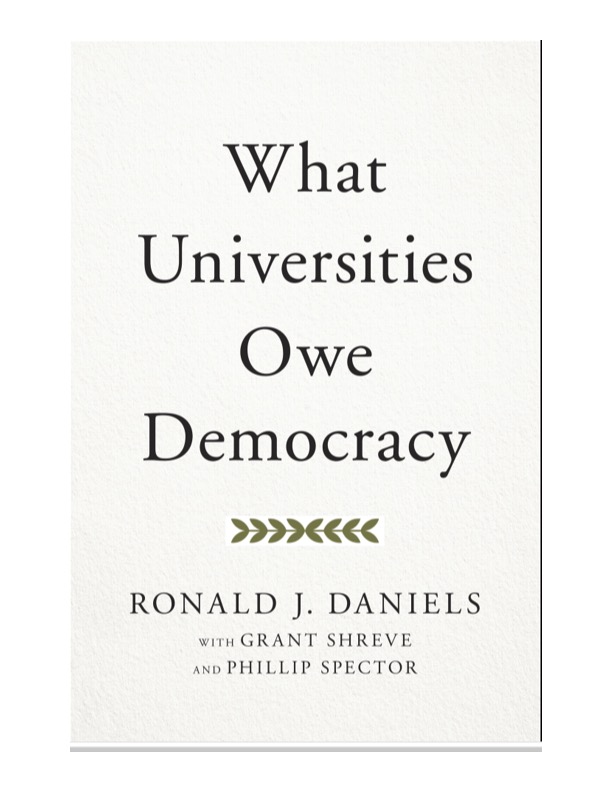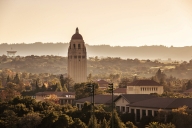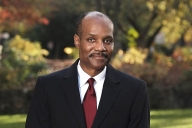You have /5 articles left.
Sign up for a free account or log in.

“Universities are a bulwark institution of democracy,” says Daniels.
Courtesy of Johns Hopkins University
In his new book, What Universities Owe Democracy (Johns Hopkins University Press), Johns Hopkins University president Ronald J. Daniels argues that American democracy is in peril -- and that institutions of higher learning are uniquely poised to rescue it. Inside Higher Ed spoke with Daniels about what universities can do to help ensure that liberal democracy fulfills its promise of justice and equality for all.
The interview has been edited for space and clarity.
Q: Why do universities owe democracy anything?
A: If one looks at liberal democracy, a number of core institutions are implicated in fostering its effectiveness: an independent judiciary, competitive political arrangements in state and federal legislatures, the media. Universities stand in a similar position as a bulwark institution of democracy, for several reasons. One is the very significant role they play in promoting social mobility and achieving the promise of Jeffersonian democracy, of equal opportunity and of ensuring that the most meritorious are able to get the benefits of higher education, which we know are significant. Second, universities play a very important role in equipping students, who upon graduation will go out into the world and be citizens, with the skills to be effective participants in a very hurly-burly political process.
Third, universities are critical for the role they play in creating and storing knowledge, and particularly in ensuring that there are verifiable facts to help mediate claims that are made i n democracy. And finally, given the success we’ve seen over the last several decades in making universities more diverse, and to the extent that we have this incredible opportunity when students are brought together from different geographic, religious, racial and political backgrounds, it seems to me to be a really important moment in which we can educate them to navigate difference, and maybe move beyond some of the really pernicious aspects of our current democracy where there’s such extreme polarization and demonization of those who hold views different from your own.
n democracy. And finally, given the success we’ve seen over the last several decades in making universities more diverse, and to the extent that we have this incredible opportunity when students are brought together from different geographic, religious, racial and political backgrounds, it seems to me to be a really important moment in which we can educate them to navigate difference, and maybe move beyond some of the really pernicious aspects of our current democracy where there’s such extreme polarization and demonization of those who hold views different from your own.
Q: As you point out in the book, universities have in recent years done a much better job of increasing diversity in admissions and access than in fostering interaction among diverse constituencies once they’re on campus. How can universities improve on that?
A: Over the last several years, we have allowed students, when they come into our residential programs, to be able to self-select the people with whom they share residence rooms. That sorting has -- not surprisingly -- just replicated a lot of the sorting that has taken place in America generally. And to the extent that students find people before they come in who share the same socioeconomic status, sometimes religious status, geographic identity and so forth, we’ve allowed them to undermine the unique opportunity that is provided when you bring all these students together in a very intense environment for four years. So I think the move that several institutions have made over the last couple of years -- Duke, for one, and this past year we decided to do the same -- to end the ability of students to self-select, is really important.
We’re also thinking more about the ways in which we use architecture and the creation of new spaces to encourage the interaction of students across different groups. That’s not just an afterthought; it’s core now to how we’re thinking about campus design. In the context of a new student center we’re building here at Hopkins, the one cardinal rule we have is that no one owns space, that basically students can rent space in various meeting and conference rooms. And it’s exciting to imagine the kinds of meetings that student groups will have side by side with one another; it just increases the possibility of collision. At another level, it recognizes the complexity of our students. For two hours you may be going to a meeting with the Republicans on campus, but for the next two hours, you’re going to a meeting of the Black Students Union, and then after that, you’ll drop by our LGBTQ group. We carry multiple identities, and what this is trying to do is encourage collision, but also demonstrate the complexity that our students bring in the multiple identities they have.
The other thing that we’re trying to do is very deliberately create more moments of debate on campus. Instead of holding events where there’s just a single speaker who attracts a particular portion of the student body, we are bringing in people with widely divergent perspectives and giving them a forum on campus. In this way, we’re trying to reinforce the sense that we can have really good and productive conversations across pretty deeply held differences and at least understand the extent to which, at core, the differences are motivated by wholly different underlying values or reflect different understandings of the facts. The university is an important site for this kind of contestation and interrogation of ideas that brings us closer to the truth. We’ve got to be more intentional about how we’re modeling these moments so that we get out of the rut of suspicion, distrust and deep acrimony that is so dominant in contemporary politics.
Q: You don’t delve too deeply into the debate over free speech on campus -- the trend in recent years of shouting down or disinviting speakers with unpopular or controversial views. How can universities balance protecting free speech with ensuring inclusivity for all?
A: It’s not that I’m naïve about or dismissive of these moments when speakers are deplatformed or disinvited. Generally, I believe they’re bad for universities. And I feel strongly that one has to accord as wide a berth as possible to accommodate different and provocative views. But at the same time, when we talk about core values, we also have a core value in ensuring that every person who is enrolled in the university, irrespective of their background, deserves a right to full participation and a sense of entitlement of being in the institution. That is a starting point as well. And so what I’m hopeful we are able to do -- and of course, there are times when this is tested, and it’s difficult -- but it seems to me that as you declare and reinforce, for very good reason, the commitment to free speech and to the contestation of ideas, it’s also important that we don’t in any way undermine the sense of entitlement of everyone who’s enrolled in our institution to be here and to be full and active members of that conversation.
Q: As you point out, universities are among the most liberal institutions in America, with the vast majority of faculty identifying as liberal. Given the widening gap between Democrats and Republicans over the value of a college education, how can universities better reflect the plurality of views in the country, including conservative ones?
A: There is no debate over the reality that our universities are increasingly populated on the faculty side by people who register Democrat. And as I’m walking the campus, and I’m teaching classes, I’m very alert to the extent to which this left lean is affecting the educational mission of the university. The student view is that even though they at times will know, not surprisingly, the political and ideological convictions of the faculty, they also report that faculty do understand their professional obligations, and ensure -- particularly in classes in political science, and history, and so forth -- that conservative views are generously and faithfully presented to the students.
I think a more serious challenge is the extent to which a lot of the important intellectual work being done in conservative political circles is not taking place on our campuses; it’s taking place in think tanks, and in other centers outside the university. I think that’s really bad for our campuses, and it’s bad for America. Particularly with a significant portion of this country identifying themselves as conservative, we want to have these views embedded in our campus. And we want to have those views developed and refined here, in a setting where the people advocating for them have to contend with challenges from the left in the same way that the quality of analysis and scholarship being done by progressives will be strengthened by their interaction with conservative scholars.
Q: Is the goal to encourage more conservative thought and exploration among faculty members? How do you do that?
A: Every time there is an opening in a department for a new faculty member, there is invariably a discussion as to what should the priorities be? It seems to me that it’s entirely appropriate in that setting for faculty to be thinking about the importance of reaching out to scholars who are conservative, and to see them as important additions to our scholarly environment.
Q: You argue that stewarding facts is one of higher education’s chief functions. But as we know, misinformation and untruths have gained a real foothold in the digital age. How should higher education deal with people such as climate deniers, who distort facts for their own purposes?
A: It starts with the sense that we have expertise. And typically, we also have research and data that can help discredit some of the distortions and fake facts that are circulating. Given that, it seems to me that the university has a role to play first and foremost in making its research, its facts, its data available and accessible to the broader world. Something I discuss in the book is the unique opportunity that [Johns Hopkins] had over the duration of the pandemic to do just that with the Coronavirus Resource Center. That site initially tracked the level of COVID infection and mortality internationally, and then we got more finely grained data at a subnational level and went on to provide data and analysis on a number of different dimensions of the pandemic. That was a moment in which the university was able to step into a breach where there was no comparable tracking instrument offered by national or NGO organizations.
From that we learned just how important it was to be able to share facts and expertise with the public and to do so in ways that made good use of data visualization tools, and good commentary around the data, so the public could really have confidence in the information. And I think there are lessons for that in other areas; whether it’s across medicine, public health or economic and social affairs, universities play a significant role in that kind of data stewardship. And I think there’s an even larger role we can play.
Q: What are the challenges of teaching citizenship in a country where people -- depending on such things as race, geography, education, level of wealth -- have such vastly different experiences of what it’s like to be a citizen?
A: I’ve really been moved by the possibilities for creating agreement on what we should be educating for when we talk about the character, the performance and the aspirations of American democracy. I’m looking right now at a set of documents produced by a bipartisan group of academics, educators and other experts, called, “Educating for American Democracy.” They have been working for some time on the development of a comprehensive K-12 curriculum that essentially develops a road map for how at each stage one can educate students in the knowledge and the required skills and habits for American democracy. That to my mind shows what is possible here. We may be divided on a number of issues, but it’s striking to me that when you put a bipartisan group together and ask them to work on this, it turns out, we can agree on the fundamentals. And to the extent that we can’t, it really does behoove us to share that understanding and deliberately educate for it.
Q: Shortly into your tenure as president, Johns Hopkins eliminated legacy preferences in admissions. Why was that so important to you, and how does it connect with your larger goal of deploying universities to strengthen American democracy?
A: In many parts of this country, universities are understood to be highly elitist, exclusionary institutions where, rather than busting up privilege, we’re reinforcing it. Legacy admissions and the open commitment to their perpetuation can’t help but foster that narrative. I do understand the putative benefits of multigenerational affiliation with the university and the financial contributions that ostensibly follow from that, but even if that’s all true -- and the empirical data, and our own experience, suggests that it’s overstated -- the question is, what is the cost of that commitment, in terms of how people understand the idea of the university being this powerful place, in which you can dramatically increase social mobility and change the trajectory of people’s lives? So many different outcomes are associated with the receipt of a university degree. And given how important that benefit is, to say we openly will continue a practice that confers significant benefits on people whose children have had every advantage in terms of stability of family, quality of education, nutrition and other dimensions, to say that after all those differences, we are going to put the thumb on the scales once again in favor of those groups, seems to me to be indefensible. The practice is really at odds with our foundational role and with democracy.
Q: You probably heard about the Brown alum who started an organization called Leave Your Legacy, which tries to persuade other alumni from various schools to avoid giving money to their alma maters unless they end legacy admissions.
A: I think to the extent that the rationale is very much based on the assumed interest of alumni in continuing this practice, the alumni saying, “Hey, wait a second, we’re not there for that,” helps shift the political dynamic in a way that creates possibilities for governing boards to shift their practices. I see this only as constructive in ensuring a more principled resolution of this issue.
Q: Is there anything we haven’t touched on that we should have?
A: I probably should have said this earlier, but what I really try to do in the book is emphasize the extent to which I -- and indeed, so many people -- feel this is a perilous moment for democracy. And it is interesting that if one looks back over the years in the United States, whenever there has been a sense that democracy has been in peril -- you know, whether it was during the Civil War, or the two world wars -- the universities, with support from government, have really understood their role as bulwark institutions of democracy. And I fear in this moment, as much as we do to support democracy, there is an opportunity here to do more. And doing more with some urgency is really essential right now. We’re not bystanders. We are indispensable institutions to democracy flourishing.








